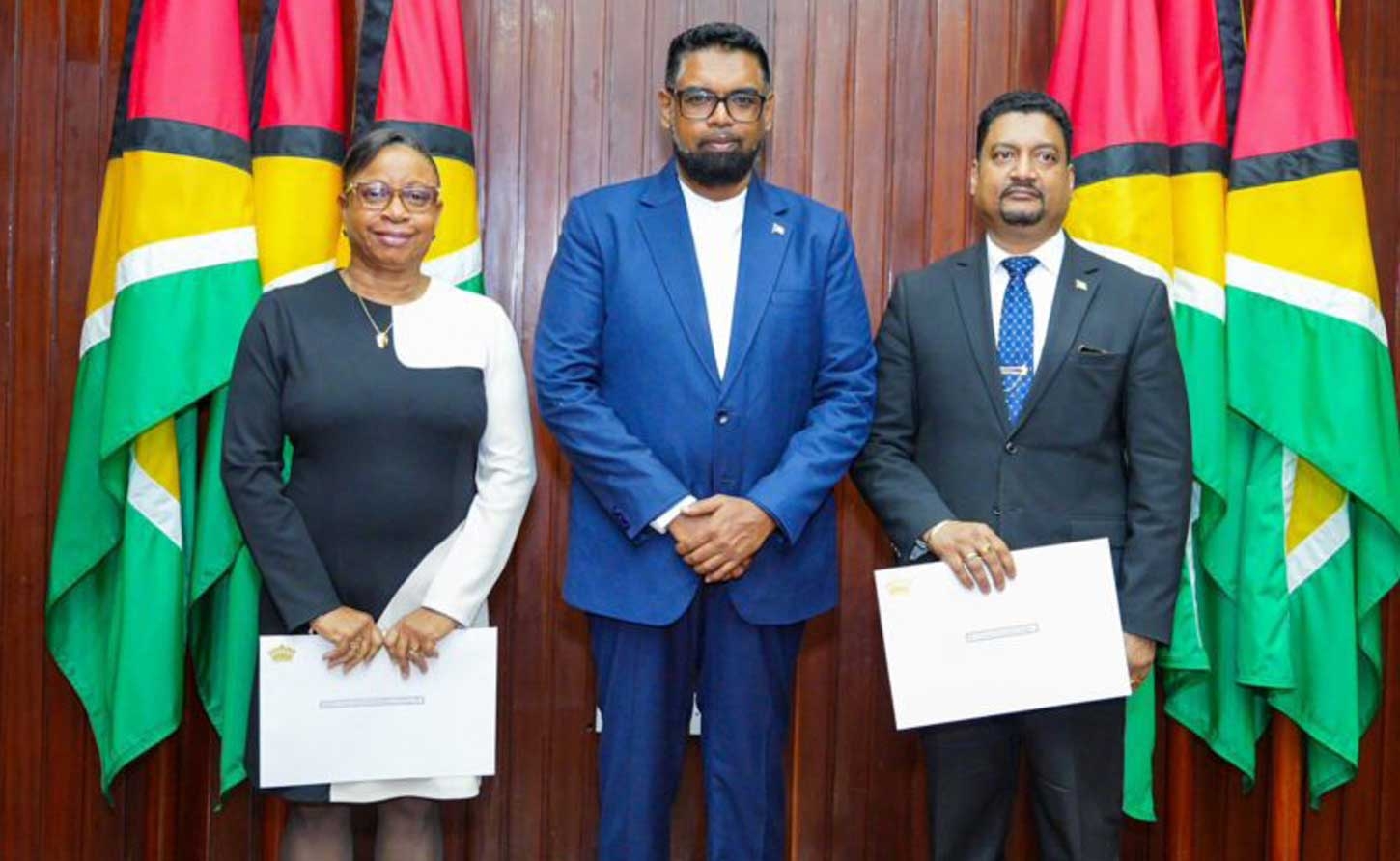GUYANA'S Judicial Limbo: Two Decades of Acting Appointments and Political Paralysis

GEORGETOWN, Guyana, August 5, 2025 - The ceremony at Georgetown's Office of the President should have been routine by now—another swearing-in, another promise of judicial continuity. Yet as President Irfaan Ali administered oaths to Justice Roxane George-Wiltshire S.C. and Justice Navindra Singh as Acting Chancellor and Acting Chief Justice respectively, the word "acting" carried the weight of two decades of institutional failure.
In a democracy where the rule of law should reign supreme, Guyana's highest judicial offices have become permanent temporary positions, a constitutional contradiction that would be farcical if it weren't so damaging.
The Latest Band-Aid
With Justice Yonette Cummings-Edwards proceeding on leave, Ali's administration scrambled to fill the void with familiar faces in familiar roles—acting appointments that maintain the status quo while avoiding the hard political work of permanent solutions.
The President's ceremony rhetoric spoke of "continuity and efficient functioning," buzzwords that ring hollow after 20 years of judicial leadership gaps that would shame any functioning democracy.
Ali emphasized his administration's commitment to "justice, fairness, and the rule of law," yet these noble aspirations crumble against the reality of a judiciary that has operated without permanent leadership since the early 2000s.
It's political theater masquerading as governance, with each acting appointment serving as another postponement of the fundamental question: why can't Guyana's political class agree on permanent judicial leadership?
Two Decades of Institutional Drift
The numbers are staggering and shameful. Twenty-plus years without substantive appointments to the nation's highest judicial offices represents more than administrative inefficiency—it's a systematic undermining of one of democracy's three pillars.
While Caribbean neighbors have navigated judicial transitions with relative stability, Guyana remains trapped in a cycle of temporary fixes that serve political convenience over institutional integrity.
This isn't merely about empty titles. The Chancellor oversees the administration of justice across the entire legal system, while the Chief Justice presides over Supreme Court decisions that shape citizens' lives and national direction.
These roles demand individuals of unquestionable caliber and independence, yet the continued reliance on acting appointments signals to both the legal profession and general public that political calculations trump judicial excellence.
Political Chess, Judicial Pawns
Opposition Leader Aubrey Norton's criticism cuts to the bone of the problem, alleging that Singh's appointment reflects PPP political bias rather than merit-based selection. His claims that more senior judges were overlooked for perceived party loyalists illuminate the toxic dynamic that has paralyzed judicial appointments for two decades.
Whether Norton's specific allegations hold water matters less than the broader pattern they represent—a government-opposition deadlock that treats judicial appointments as political prizes rather than institutional necessities.
This isn't unique to the current administration. Previous governments have similarly failed to build the consensus required for permanent appointments, preferring the flexibility of acting positions that can be adjusted based on political winds.
The result is a judiciary that operates under a permanent cloud of uncertainty, with judges and citizens alike unsure whether leadership changes reflect legal principles or partisan maneuvering.
Democracy's Weakest Link
The implications extend far beyond Georgetown's corridors of power. Citizens facing the legal system encounter courts led by temporary appointees whose authority carries implicit expiration dates.
International investors and regional partners witness a democracy unable to permanently staff its most crucial institutions. Young lawyers contemplating judicial careers see a system where political connections may matter more than legal acumen.
Caribbean integration and regional leadership become hollow concepts when Guyana cannot demonstrate basic institutional competence in judicial governance. While CARICOM members look to establish stronger legal frameworks and cross-border cooperation, Guyana's judicial leadership vacuum undermines its credibility as a regional partner.
Breaking the Cycle
The path forward requires political courage that has been absent for two decades. Genuine judicial reform would demand that government and opposition prioritize institutional integrity over partisan advantage, establishing transparent criteria for judicial appointments and creating mechanisms that transcend electoral cycles.
Yet current patterns suggest little appetite for such fundamental change. Acting appointments offer political leaders maximum flexibility with minimum accountability—a sweet spot for politicians who prefer managing crises to solving them.
As Justice George-Wiltshire and Justice Singh settle into their latest acting roles, Guyanese citizens face an uncomfortable truth: their democracy's foundation remains built on temporary fixes and political expedience.
After 20 years of judicial limbo, the question isn't whether this system can continue—it's whether a democracy can truly function while its highest courts operate in permanent uncertainty.
The ceremony is over. The acting continues.
-30-
